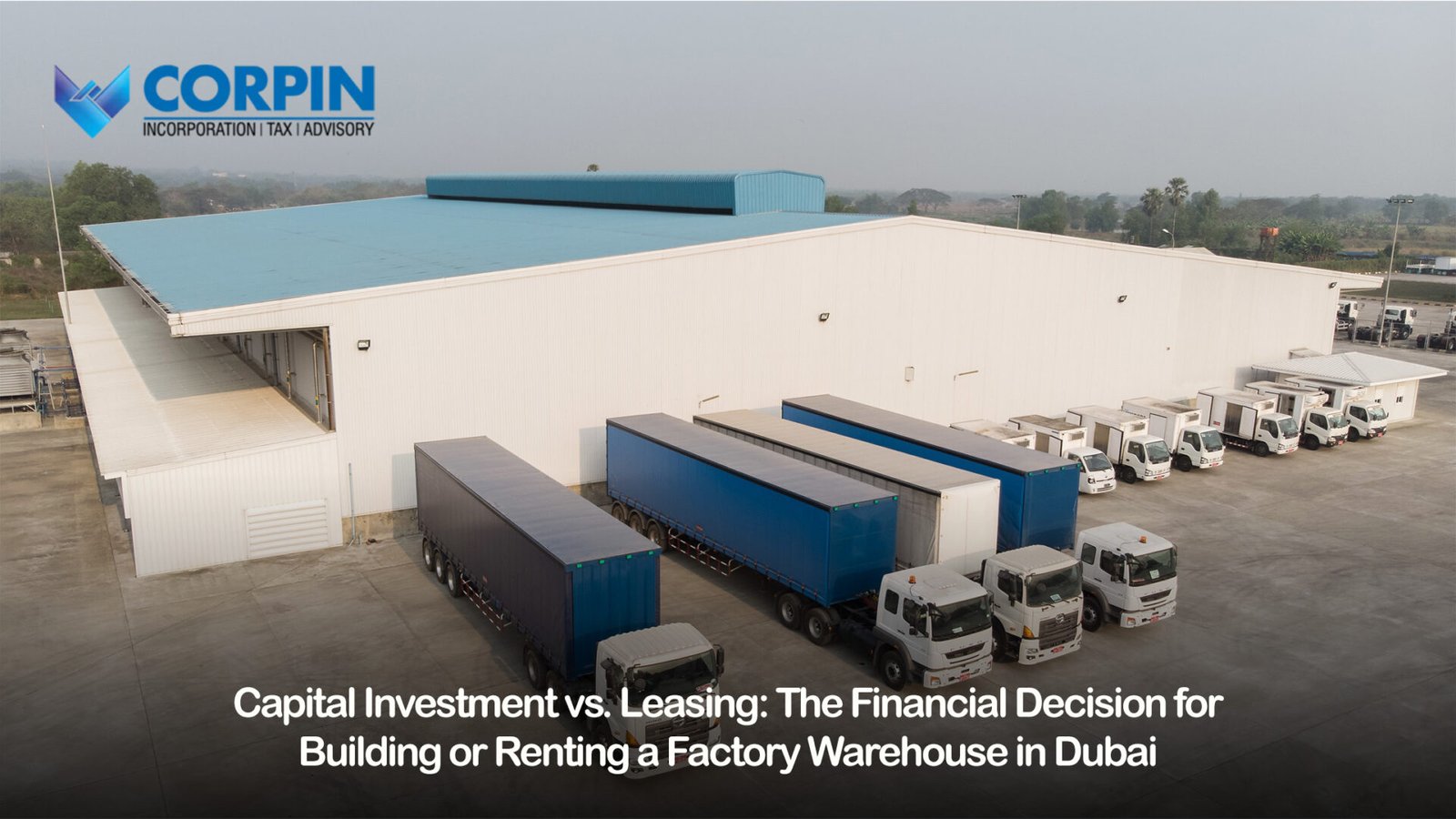With world-class infrastructure, access to two-thirds of the world’s population, and a favourable tax regime, the emirate is a powerhouse for industrial growth. However, a critical decision at the heart of any major manufacturing venture is the choice of real estate strategy: Should your company commit substantial capital to build or buy a factory warehouse, or should you maintain financial flexibility by leasing one?
This choice is far more complex than a simple monthly cost comparison it dictates a company’s balance sheet, its long-term financial stability, and its operational agility in a rapidly evolving market.
Capital Investment (Building or Buying)
Choosing to own your factory warehouse is a bold, long-term commitment that positions the property as a core business asset.
The Case for Ownership: Control, Equity, and Stability
- Customization and Control: For manufacturers, this is the biggest advantage. Owning the property grants unparalleled control over its design, layout, and specifications. You can build specialized loading docks, install overhead cranes, customise power supply for heavy machinery, and tailor the space to meet specific HSE (Health, Safety, and Environment) requirements without needing landlord approval.
- Equity Building and Appreciation: Unlike rent, mortgage payments contribute to a tangible asset on the balance sheet. In key industrial zones like Jebel Ali Free Zone (JAFZA) or Dubai Investments Park (DIP), industrial land and property values have historically appreciated due to high demand and supply constraints, offering a potential long-term capital gain.
- Predictable Long-Term Costs: While the initial cost is immense, once any mortgage is paid off, the major ongoing expenses are reduced to maintenance, utility bills, and service charges. This stability shields the manufacturer from the volatility of Dubai’s surging rental market, which has recently seen significant annual increases in prime areas.
- Asset Utilisation: The warehouse can be used as collateral for loans, providing easier access to capital for equipment upgrades or operational expansion.
The Drawbacks of Capital Commitment
- High Upfront Cost: The initial outlay is substantial, involving land purchase, construction costs (which can be 20-50% higher for specialized facilities like cold storage), DLD (Dubai Land Department) fees, and professional fees. This heavy commitment of cash severely impacts a company’s working capital, which could otherwise be used for R&D, technology (Industry 4.0), or marketing.
- Lack of Flexibility: Once the factory is built, the company is physically locked into that location and size for decades. If market conditions shift (e.g., a need to move closer to a new port or downsize due to automation), disposing of the asset can be a slow and complex process.
- Maintenance Burden: The full responsibility for maintenance, repairs, and compliance updates falls on the owner, requiring an in-house facility management team or expensive outsourcing.
Operating Lease (Renting)
Leasing a Ready-Built-Warehouse (RBW) is the preferred route for companies prioritising immediate deployment and financial agility.
The Case for Leasing: Agility and Liquidity
- Maximized Working Capital: Leasing requires significantly lower upfront costs, typically limited to a security deposit and a few months’ rent. This preserves crucial capital for core business activities, such as purchasing expensive manufacturing equipment, hiring skilled labour, or expanding into new markets.
- Operational Agility: Leasing offers supreme flexibility. Manufacturers can easily relocate to a larger or smaller facility as business needs evolve, or switch to a strategically superior zone (e.g., from Dubai Industrial City to Dubai South) upon lease expiry. This is vital in a fast-growing region.
- Outsourced Responsibility: In most commercial leases, the landlord is responsible for major structural maintenance and external repairs, reducing the operational burden and unexpected capital expenditures for the manufacturer.
- Immediate Deployment: Ready-built warehouses in major free zones like JAFZA allow for rapid setup, significantly shortening the time-to-market compared to a multi-year construction project.
The Drawbacks of Leasing
- Rising Costs and Volatility: This is the most pressing challenge. With Dubai’s industrial rents on a consistent upward trend (some areas seeing 20%+ annual increases), long-term budgeting becomes a significant risk. Companies face potential financial strain upon lease renewal.
- Limited Customization: Tenants are often restricted in the modifications they can make to the property. Major structural changes or installation of permanent heavy machinery may be prohibited or require expensive, lengthy approvals from the landlord and authorities.
- No Equity Built: All rental payments are pure operating expenses, creating no long-term asset value for the company. At the end of the lease, the company has nothing to show for years of payments.
Final Thoughts
The financial decision between capital investment and leasing hinges on two factors: time horizon and growth certainty.
- A Large Multinational with a decades-long commitment to the region, highly specialized production needs, and robust capital reserves will likely lean towards Ownership for stability and custom control.
- A Start-up, SME, or Company entering a new market that values flexibility, needs to conserve capital, or has uncertain long-term space requirements will almost certainly choose Leasing.
Regardless of the path chosen, navigating the initial setup, licensing, jurisdiction choice (Free Zone vs. Mainland), and facility compliance in Dubai is an intricate process. For manufacturers looking to move beyond the real estate decision and focus solely on production, having expert guidance is non-negotiable. Corpin Consultants offers specialized business setup and corporate advisory services, ensuring that every aspect of your factory establishment from selecting the right Free Zone jurisdiction to securing all necessary industrial permits is handled with precision, allowing your business to launch efficiently and remain compliant from day one.





 Cost Calculator
Cost Calculator Book your Free Consultation
Book your Free Consultation